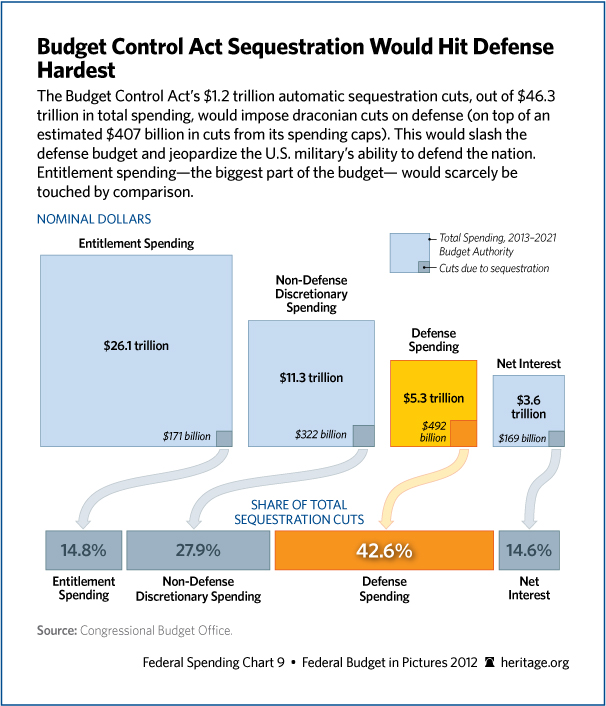Congress Rightly Seeks Details on Defense-Devastating Sequestration
Patrick Louis Knudsen /
With the commander in chief refusing to address the crippling, automatic cuts to national defense scheduled to start on January 2, Congress is appropriately stepping up and demanding answers.
That is the aim of the Sequestration Transparency Act of 2012 (H.R. 5872), which is being taken up in the House this week. It requires the Obama Administration to detail the impact of these across-the-board reductions, which result from the enforcement component of last year’s debt-ceiling agreement, the Budget Control Act. The House measure follows a recent Senate farm bill amendment, sponsored by Senators John McCain (R–AZ) and Patty Murray (D–WA) calling for an even more extensive evaluation.
These actions are significant for two reasons: They draw much-needed attention to the damage the threatened “sequestration” will do and is doing to national security, and they demonstrate Congress’s willingness to stand up to an Administration that seems almost casual about the threat.
Sequestration will have a crippling impact on the Pentagon, which will absorb roughly half—$492 billion—of the $1.2 trillion in cuts over 10 years, even though national defense is less than one-fifth of the budget. Meanwhile, the badly designed mechanism shields the biggest contributors to Washington’s spending and debt: It exempts Social Security, Medicaid, and all but 2 percent of Medicare. These three programs account for nearly 45 percent of total federal spending.
The Sequestration Transparency Act, authored by Representative Jeb Hensarling (R–TX), chairman of the House Republican Conference, was approved by the House Budget Committee 30–0 and appears to have broad support in the full House.
Regrettably, President Obama seems not to share the concern. The White House “has dismissed calls for the information, saying Congress should come up with its own plan to reduce the deficit that would make the automatic reductions unnecessary,” says the July 16 edition of the CQ Budget Tracker Newsletter.
An April 25 report by the Government Accountability Office says the Office of Management and Budget (OMB) “has not issued any guidance to agencies on preparing for implementation of [sequestration].” OMB has not even begun collecting data concerning sequestration’s likely effect on programs and activities, according to a May 25 letter from acting director Jeffrey D. Zients.
But not to worry: “Approximately six months remain before sequestration is scheduled to take effect, and Congress has time to act to avoid it,” Zients wrote on June 15. This ignores the harm already being done by the threat of the defense cuts and the growing skepticism that Congress and the President will do anything to stop them.
The Administration’s inaction is not surprising; the White House commonly misses even routine budget deadlines, such as its Mid-Session Review, due yesterday but delayed indefinitely, as noted by Senator Jeff Sessions (R–AL), ranking member of the Senate Budget Committee. The effort by Congress shows a degree of leadership lacking at the other end of Pennsylvania Avenue.
Federal spending—especially in entitlement programs, the main drivers of government deficits and debt—is running out of control and needs to be reduced. But these reckless and unacceptable defense cuts should be replaced with other reductions.
Meanwhile, lawmakers are taking the right steps in pursuing sound information on the impact of sequestration—and the President has an obligation to deliver.

